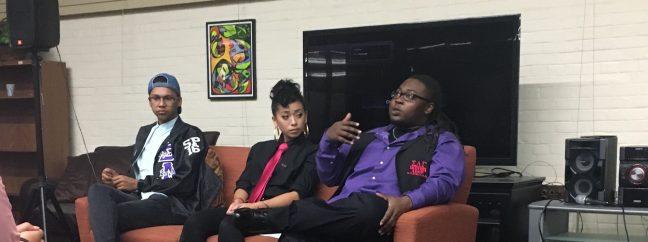In an effort to educate campus members on issues the LGBTQ+ community faces, three panelists spoke on Tuesday night about their personal experiences.
The panel, hosted by the Kommanding Kappa Gamma chapter of Sigma Lambda Gamma National Sorority Inc., included University of Wisconsin graduate student Ace Hilliard, UW graduate student Doua Kha, and a senior Tony Jackson. They discussed their journeys through life in reference to their sexuality and gender identities.
“It was in high school that I was really able to start exploring my gender, and that came with gender expression,” Hilliard said.
When he came to college, Hilliard felt as though he had a clean slate due to his lack of parental support. He turned this experience into a positive by finding himself and doing things that expressed how he felt, such as dressing how he pleased.
Though he was in a sorority at the time he came out as transgender and felt as though he was still accepted. He worked with the sorority to make the bylaws more accepting to those who do not conform to a specific gender.
“I feel like myself,” Hilliard said.
On the other hand, Jackson felt the transition to college as a gay man was more difficult because he grew up in southern California, a place he feels is very accepting of the LGBTQ+ community.
As a freshman, living in the dorms created multiple “awkward” situations, such as coming out to his roommate and sharing the large communal bathrooms.
“I still found myself very timid talking to people,” Jackson said.
Jackson added he felt unsafe after the Orlando shooting happened. For Jackson, the Orlando shooting symbolized a threat to his existence and the existence of LGBTQ+ individuals.
Throughout their education, panel members found an increase in resources and programs for LGBTQ+ students. Attitudes toward the community have changed as well, the panel agreed.
When Hilliard began his freshman year in 2009, he said he didn’t see any LGTBQ+ programs, especially in multicultural communities. As the years went on, and LGBTQ+ issues became more prevalent, UW had “no option” but to provide more resources for those students, Hilliard said.
“I think that language in general has changed,” Kha, who identifies as a nonconforming womyn, said. “Being aware of your language and how impactful it can be has definitely changed.”
When she first came to campus, Kha said she was able to find people who identified with her Asian American identity and her queer identity, but she was unable to find a community that was accepting of both.
“I’m still very critical of Asian Americans [not] being more inclusive toward queer voices,” Kha said. “I feel like it hasn’t changed.”
The panel agreed finding a supportive community is instrumental to self acceptance, which for them was their sorority or fraternity.
More conversation is happening in Greek letter organizations, even those with a religious foundation, and those organizations are becoming allies to those in the multicultural LGBTQ+ community, Hilliard said. These relationships help empower the entire community, as well as normalizing different pronouns in daily speech.
“I really hope that me being a part of Greek life and taking leadership positions has helped other people maybe want to join Greek life without thinking of that barrier of ‘I identify a certain way so I don’t know if I’m going to be accepted,'” Jackson said.


